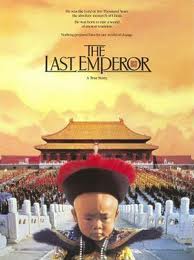Rating: 2 stars (out of 4)
The Last Emperor (1987): Dir. Bernardo Bertolucci. Written by: Mark Peploe and Bertolucci. Based upon the book From Emperor to Citizen by Aisin-Gioro Puyi. Starring: John Lone, Joan Chen, Peter O’Toole, Ruocheng Ying, and Victor Wong. Rated PG-13 for violence and sexuality. Running time: 163 minutes.
 Sometimes the Academy honors a film well outside the Hollywood system, as they did here. Bertolucci’s eulogy to the life of Aisin-Gioro Puyi, the last royal sovereign of China, wowed audiences with its vibrant visual splendor. It’s a shame the film’s legacy hasn’t stood up nearly as well as its imagery.
Sometimes the Academy honors a film well outside the Hollywood system, as they did here. Bertolucci’s eulogy to the life of Aisin-Gioro Puyi, the last royal sovereign of China, wowed audiences with its vibrant visual splendor. It’s a shame the film’s legacy hasn’t stood up nearly as well as its imagery.
From its genesis in the Forbidden City, the reign of Aisin-Gioro Puyi endures multiple political upheavals. Taken from his parents at an early age, Puyi grows up in a strange paradise in which he can have anything he wants yet is forbidden to leave. But as the outside world encroaches, he makes serious decisions that will have dire consequences for those he holds dear.
In terms of visual flair, Bertolucci and cinematographer Vittorio Storaro achieve jaw-dropping results, particularly in the early scenes in Puyi’s life in the Forbidden City. We see a world where Puyi is completely alone even as he is surrounded by detainers and servants. But Bertolucci and co-writer Mark Peploe undercut that cinematic poetry with a shoddy screenplay, in which they insist on inundating us with clunky exposition masquerading as dialogue.
Surprisingly, the entire film plays out in English, not Chinese. I might have looked past that except that none of the actors convincingly pull it off, making the end product sound like a poor English dub. Only Peter O’Toole fails to embarrass himself as Puyi’s tutor (lending not a little experience to the proceedings). And while Bertolucci stages some impressive set-pieces, they leave little impact due to poor characterization. We get some sense of Puyi’s ill-fated trajectory but never their full import.
Bertolucci appears to have worked with his cinematographer more than his actors, and the film suffers for it. The life of Puyi deserves an epic treatment, but the work on display here just doesn’t do it justice.
Next film: Rain Man, 1988